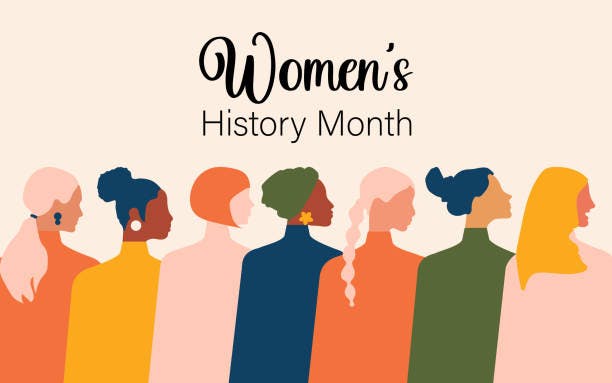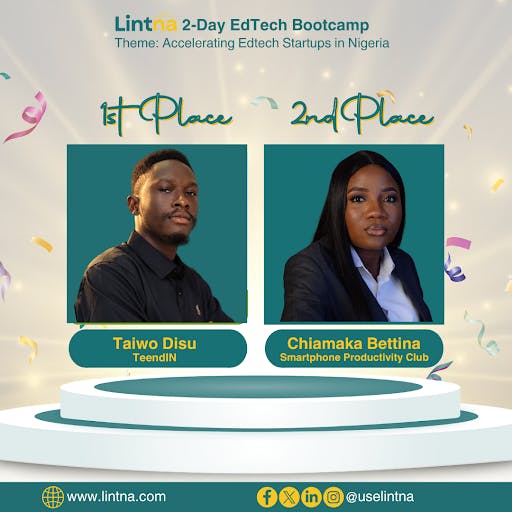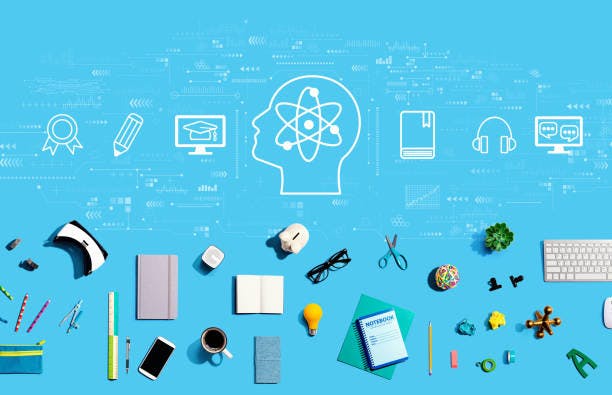14 March, 2025

 Marvellous Ihejiamaizu
Marvellous Ihejiamaizu31 March, 2024
Celebrating Women in Edtech
March is Women's History Month, a time to honor and celebrate the contributions of women across various fields, industries, and all walks of life. Women all over the world are driving forces of innovation, championing change, and unleashing value to the entire world.
Right from time, women have been pivotal in driving innovation, shaping future learning landscapes, and fostering inclusive environments that encourage everyone to reach their full potential.
This month, we spotlight the remarkable women in Edtech, whose efforts are not just transforming education but also challenging the traditional paradigms of technology and leadership with a specific focus on Africa.
The Journey so far
The journey of women in Edtech is both inspiring and emblematic of the broader struggle for gender equality within the education field. From the development of early learning platforms to the introduction of AI and Machine Learning in personalized education, women have been at the forefront, pushing boundaries and pioneering changes. However, even in the face of such challenges, African women have emerged as trailblazers.
Early innovators and educators across the continent broke stereotypes, not just by mastering technology but by integrating it into education, thereby laying the groundwork for the future of Edtech.
Their work reflects a commitment to leveraging technology to enhance educational access, engagement, and outcomes for students worldwide.
Pioneers in Edtech: A Legacy of Innovation
The contributions of women in Edtech span across research, development, and leadership. Visionaries like Daphne Koller, co-founder of Coursera, and Cindy Mi, of VIPKid, have democratized access to quality education, making it possible for learners around the globe to tap into high-quality courses and resources for free. Similarly, influential figures like Reshma Saujani, the founder of Girls Who Code, have not only contributed to the Edtech landscape by fostering an environment of learning and innovation but also by addressing the gender gap in technology and engineering head-on by providing greater access to resources, mentorship, and opportunities for skill development, fostering a more inclusive and diverse tech workforce. These initiatives highlight how women in Edtech are using technology not only to educate but also to empower.
Celebrating African Women in Edtech

Africa boasts numerous women who have made significant strides in the edtech sector. These include founders of groundbreaking edtech companies, innovators of digital learning platforms, and influential educators and policy-makers who have left indelible marks on both education and technology.
- Rebecca Enonchong (Cameroon) is a renowned entrepreneur and founder of AppsTech, a leading global provider of enterprise application solutions. AppsTech’s initiatives focus on providing scalable EdTech solutions, including e-learning platforms and educational apps.
- Ada Nduka Oyom (Nigeria) founded She Code Africa, a non-profit organization empowering girls and women in Africa with technical skills. She founded SCA in 2016 and has since impacted over 42,000 women members across various African countries while championing gender diversity in tech through it.
- Rapelang Rabana (South Africa) is an entrepreneur and computer scientist who co-founded Rekindle Learning, an edtech company dedicated to fostering continuous learning. Rabana’s innovative approach emphasizes personalized learning experiences, catering to diverse educational needs.
- Juliana Rotich (Kenya) is an information technology professional, who co-founded BRCK, an innovative company providing internet solutions for education in remote areas. BRCK produces a battery-operated modem that can run for eight hours without electricity to help solve the lack of internet access due to blackouts in Nairobi.
These women are braving the odds in the edtech space and excelling.. Their stories of perseverance, innovation, and leadership inspire and illuminate the pathway for future generations of women in technology.
The Impact of Women-Led Edtech Initiatives
Women-led edtech startups and initiatives are pioneering changes in the educational sector by leveraging technology to create more equitable learning environments. These ventures recognize the unique challenges faced by underrepresented groups in STEM (Science, Technology, Engineering, and Mathematics) and other areas and work tirelessly to address these barriers. For example, platforms dedicated to teaching coding to girls aim to inspire and empower the next generation of female technologists, addressing the gender gap in the technology sector head-on. By providing an engaging and supportive learning environment, these initiatives foster a sense of belonging and confidence among girls and young women, encouraging them to pursue careers in STEM fields.
Similarly, women-led EdTech companies are at the forefront of personalizing education. They develop apps and platforms that adapt to the students' learning styles and paces making education more effective and enjoyable. Anne Wojcicki's 23andMe is a prime example of how women-led initiatives are revolutionizing education beyond the traditional curriculum. By making genetics accessible and understandable, 23andMe has opened up new avenues for educational exploration. Students and educators can now engage with complex scientific concepts in a more interactive and personalized manner, fostering a deeper understanding and interest in science. This not only enriches the educational content available but also illustrates the potential of EdTech to make specialized knowledge more accessible to a broader audience.
Challenges and Opportunities Ahead
Despite their achievements, women venturing into EdTech entrepreneurship and leadership face a myriad of challenges, such as difficulty in securing venture capital funding, confronting entrenched gender biases, and navigating a tech landscape that has historically marginalized women voices. Notwithstanding these hurdles, the evolving dynamics of the tech and educational sectors offer a fertile ground for change and innovation, spearheaded by women.
Securing funding remains a significant barrier for women-led startups across all sectors, including EdTech. Data has shown that ventures led by women receive a fraction of the venture capital funding that flows to their male counterparts. This disparity is not only a financial issue but also a matter of visibility and credibility in the eyes of investors, many of whom still harbor conscious or unconscious biases about the capabilities and potential of women-led enterprises. However, the narrative is slowly shifting as more success stories emerge, showcasing the profitability and impact of investing in diversity. This change is partly driven by the growing number of women in venture capital and an increased focus on gender equality in the investment community.
Overcoming gender biases in the tech industry is another persistent challenge. The stereotype of the tech entrepreneur or innovator remains predominantly male, creating an environment where women often have to work harder to prove their worth and to have their voices heard. These biases can affect everything from team dynamics to career advancement opportunities. Yet, awareness of these issues is rising, and with it, concerted efforts to create more inclusive and equitable workplaces.
Fostering Future Generations

Image by iStock
Women leading the charge in EdTech are not just entrepreneurs, developers, or educators; they are pioneering figures and role models, embodying the potential and possibilities that await in the realms of science, technology, engineering, and mathematics. By breaking through barriers and succeeding in a domain historically dominated by men, these women offer tangible proof that gender does not define one's ability to innovate, create, and lead in technology and education.
Their presence and success in EdTech serve a dual purpose. Firstly, it challenges and gradually dismantles the longstanding stereotypes and cultural narratives that have, for too long, steered girls away from pursuing interests and careers in STEM. By simply being visible and active in the field, women in EdTech send a powerful message that these areas are open and welcoming to all who have passion and curiosity, regardless of gender.
Secondly, through initiatives specifically designed to engage and empower young girls in technology and science—such as coding boot camps for girls, mentorship programs, and scholarships—women in EdTech are actively investing in the growth and development of future generations. These programs not only provide the skills and knowledge needed to excel in STEM but also offer a sense of community and belonging, which is crucial for young learners. They create spaces where girls can see themselves reflected in their instructors and peers, fostering an environment of support and encouragement. This inclusivity not only benefits female students but enriches the learning experience for all students, promoting a more holistic and empathetic approach to education.
Joining the Celebration

Image by iStock
This Women's History Month, we invite you to explore and celebrate the contributions of women in Edtech. Whether by engaging with platforms led by women innovators, participating in discussions about gender equity in technology and education, or simply learning more about the pioneering women in this field, there are myriad ways to support and uplift the incredible work being done.
As we celebrate these achievements, let's also ponder on the road ahead. The journey toward gender equality in Edtech and STEM at large is ongoing, and each step forward is a testament to the resilience, creativity, and leadership of women in these fields. By recognizing and supporting their contributions, we not only honor their legacy but also pave the way for a more inclusive and innovative future in education technology.
In the spirit of Women's History Month, let us all commit to championing the role of women in Edtech, encouraging diversity of thought, and fostering an environment where the next generation of female leaders can thrive. Together, we can continue to break barriers and redefine the landscape of education and technology for the better.






